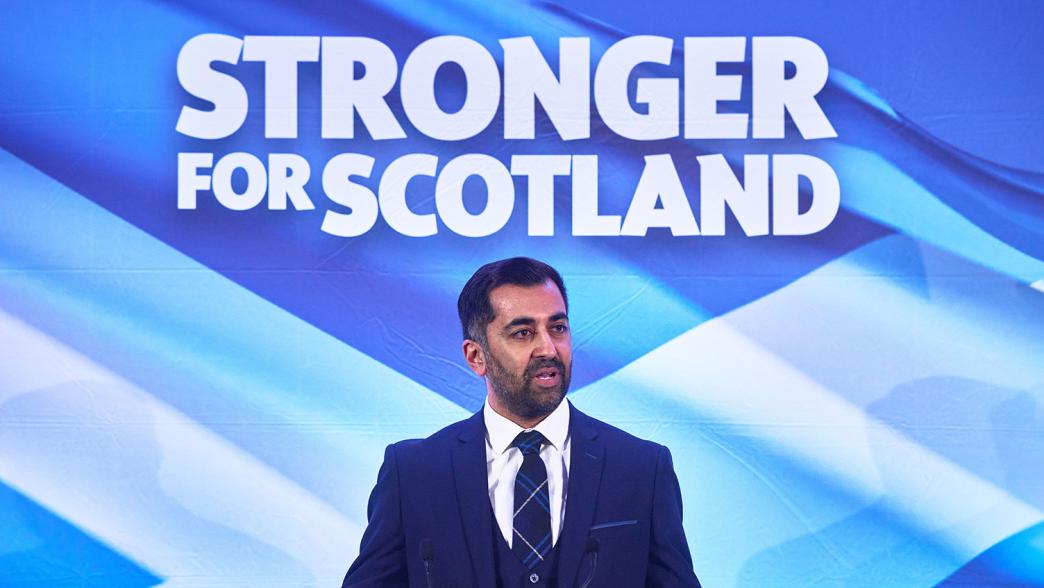Three key challenges facing Scotland’s new first minister
Humza Yousaf, elected leader of the SNP, must now assemble his top team, set out his independence strategy, and reset relations with Westminster.

After a gruelling leadership election that followed the surprise resignation of Nicola Sturgeon in February, Scottish health secretary Humza Yousaf has been elected as leader of the SNP. He becomes Scotland’s first minister this week. He will enter office with three key tasks in his in-tray.
Yousaf needs to build a new ministerial team that can unite his party and tackle the problems facing Scotland
Two positions in the Scottish cabinet are immediately available: Yousaf’s old job as cabinet secretary for health and social care as well as the deputy first minister position previously held by John Swinney. Yousaf may also take this opportunity to reshuffle his cabinet more broadly.
As he becomes first minister following a bruising leadership election with a close outcome, Yousaf will likely seek to take this opportunity to reunite the party. A big decision will be what role to offer runner-up Kate Forbes, with whom Yousaf clashed during the campaign including over his own record in government and on social issues such as gender reform and same-sex marriage.
Reappointing Forbes to her current finance and the economy brief, or moving her to another senior position, would help Yousaf to publicly bury that hatchet and show Forbes’ supporters they remain part of his vision for the country. But reconciliation may not be easy. Forbes opposes key planks of Yousaf’s plans for government and is unpopular among much of the party’s young activist base.
Yousaf also needs to decide how to approach Ash Regan, who came third in the contest. He may decide it is better to leave her outside of government, given her limited experience and popular support – Regan secured just 11% of the vote. But she could prove to be a notable backbench critic, including on the question of how the new first minister intends to deliver independence, a key sticking point for whoever was to succeed Nicola Sturgeon.
More broadly there is the question of whether Yousaf prioritises the promotion of a new generation to cabinet or the retention of senior figures – such as Angus Robertson and Shona Robison – who backed him during the leadership contest.
A final space to watch is what happens to the two Scottish Green ministers currently in government, Lorna Slater and Patrick Harvie. The Greens have opted to remain in government – which may not have happened had Forbes or Regan won – but their roles may vary, subject to agreement with the new first minister.
The SNP will expect Yousaf to set out a credible independence strategy, but he will need to focus on governing
Developing a new independence strategy has been a key task for the SNP since the UK Supreme Court ruled that holding a referendum without the approval of the UK parliament was not within the Scottish parliament’s powers.
Yousaf is likely to abandon Sturgeon’s preferred ‘de facto referendum’, having warned that “there’s no magic wand to deliver independence” and promising his party only to “kickstart our grassroots, civic-led movement” as part of a long-term drive to build support for independence. This position may well invite pressure from SNP members and the wider independence movement to set out a clearer route map than this.
However Yousaf will not want the constitutional question to dominate the agenda at a time when the public has serious concerns about the state of Scotland. New Ipsos Scotland polling reveals that 50% think Scotland is going in the wrong direction, compared to only 25% saying the opposite.
Approval of the Scottish government’s performance in key policy areas is also poor: just 30% say it is doing a good job managing the economy and 26% for improving the education system; on the NHS it is just 23%. Moving these numbers in the right direction before the next UK and Scottish general elections will be crucial, and possibly more important, tests for Yousaf.
Yousaf should take this opportunity to reset relations with the UK government
Since becoming prime minister in October last year, Rishi Sunak appears to have diverged from Johnson and Truss’ openly adversarial relations with the devolved administrations. Sunak convened the first prime minister and heads of devolved government council in November, as part of the UK’s new intergovernmental relations structures.
This may offer Yousaf an opportunity to improve the wider Westminster–Holyrood relationship and seek new ways to work together. This will mean acknowledging that Scotland remains part of the United Kingdom for the time being and that some policies are most effectively delivered at a UK-level. This might include the Scottish government dropping its planned bottle deposit return scheme, likely unworkable in its present form, and working instead with the UK and other devolved governments on a UK-wide approach.
A reset relationship could also involve the development of new joint policy initiatives in areas that span the divide between devolved and non-devolved areas, such as economic development, innovation policy and transport connectivity.
More contentiously, Yousaf will have to decide whether to seek to overturn Westminster’s veto of Scotland’s Gender Recognition Reform Bill. His supporters will expect him to proceed with the legal challenge, but doing so could prove distracting and could mean that he starts his tenure with another big constitutional clash with London.
However he chooses to proceed, it is clear the so-called continuity candidate in fact has the opportunity to bring significant change to how Scotland is governed.”
- Topic
- Devolution
- Keywords
- Scottish independence
- United Kingdom
- Scotland
- Political party
- Scottish National Party
- Position
- First minister of Scotland
- Devolved administration
- Scottish government
- Legislature
- Scottish parliament
- Publisher
- Institute for Government